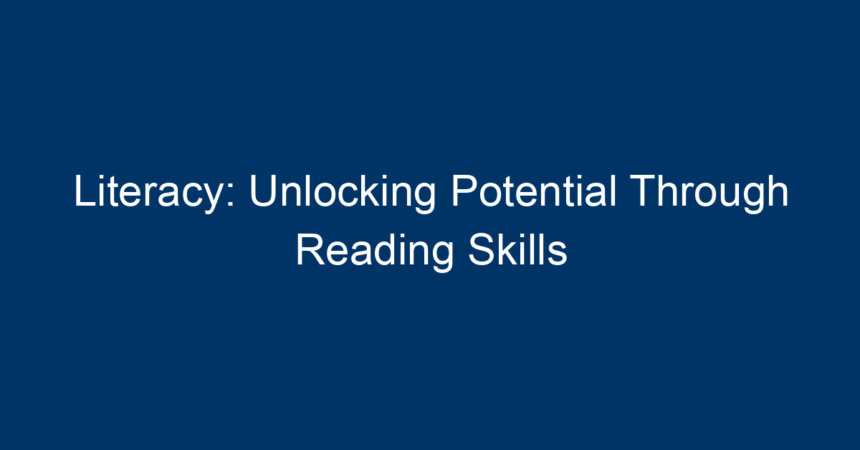In a world increasingly defined by information and communication, literacy stands as a vital skill that unlocks countless opportunities. From professional advancement to personal enrichment, the ability to read and comprehend texts is foundational not just for individuals but for society as a whole. As the 21st century advances, it is more important than ever to emphasize literacy and its critical role in shaping informed, empowered citizens. In this article, we will explore the multifaceted aspects of literacy, its impact on individual potential, and actionable ways to enhance reading skills in our communities.
Understanding Literacy: More Than Just Reading
What is Literacy?
At its core, literacy is the ability to read, write, and engage with written content. However, it extends beyond these traditional definitions to encompass skills such as critical thinking, digital literacy, and media literacy. These advanced forms of literacy equip individuals to navigate contemporary society effectively. Therefore, achieving true literacy means not only the capacity to understand words but also the ability to analyze, evaluate, and create information.
Why Literacy Matters
The role of literacy cannot be overstated. It is a fundamental building block for human development and an essential skill across all stages of life. According to UNESCO, illiteracy costs global economies billions, impeding growth and poverty alleviation efforts. Individuals who possess strong literacy skills tend to have higher earning potential, better job prospects, and improved health outcomes. Furthermore, literacy contributes to democratic participation, as informed citizens are more likely to engage in civic activities.
The Connection Between Literacy and Economic Growth
The Economic Benefits of Literacy
The economic implications of literacy are profound. A literate population boosts productivity and innovation, driving economic growth. Nations with high literacy rates often witness substantial increases in GDP, as a skilled workforce can adapt to changing market demands and new technologies. Furthermore, enhancing literacy rates can reduce unemployment, since literate individuals are more qualified and adaptable in a competitive job market.
Case Studies: Countries Investing in Literacy
Numerous countries have recognized the importance of literacy and made concerted efforts to improve reading skills among their populations. For example, Finland’s emphasis on high-quality education and extensive teacher training has resulted in one of the highest literacy rates in the world. By focusing on literacy as a national priority, Finland has paved the way for a robust economy and a well-informed citizenry.
The Impact of Literacy on Personal Empowerment
Building Confidence and Self-Esteem
Literacy is not just a functional skill; it’s also a pathway to personal empowerment. Being able to read and write effectively enhances self-esteem and builds confidence. Adults who improve their literacy skills often report feeling more capable in their daily lives, whether it’s managing finances, pursuing education, or participating in community activities. The ability to read and understand information leads to informed decision-making, which can dramatically improve quality of life.
Lifelong Learning and Adaptability
In today’s fast-paced world, the need for lifelong learning is paramount. Literacy fosters a love for reading and encourages lifelong education. In a job market that requires constant upskilling, being literate allows individuals to embrace new opportunities, whether through formal education or self-directed learning. The adaptability that comes from strong literacy skills is invaluable in navigating career changes and technological advancements.
Strategies to Improve Literacy in Communities
Community Programs and Workshops
Many communities have initiated programs aimed at improving literacy skills among children and adults. Libraries, schools, and non-profit organizations often conduct reading workshops, tutoring sessions, and literacy campaigns. These initiatives not only provide the tools necessary for acquiring literacy but also foster a sense of community and shared goals.
Incorporating Technology into Literacy Education
Incorporating technology can significantly enhance literacy learning. E-books, educational apps, and online courses offer engaging ways to develop reading skills. For instance, platforms like Duolingo and Khan Academy provide interactive experiences that help users improve their reading comprehension and writing abilities in a user-friendly manner.
Engaging Families in Literacy Development
Literacy development starts at home. Parents and caregivers play a crucial role in encouraging reading habits among children. By reading together, discussing books, and providing access to a variety of reading materials, families can create an environment that nurtures a love of learning. Engaging families in literacy initiatives creates a supportive network that amplifies the message of the importance of reading.
The Role of Schools in Fostering Literacy
Curriculum and Teaching Approaches
Schools are at the forefront of developing literacy skills in students. A well-rounded curriculum that includes diverse reading materials, writing exercises, and critical analysis promotes comprehensive literacy education. Effective teaching approaches that engage students—such as project-based learning and collaborative discussions—can significantly enhance their reading competencies.
Teacher Training and Professional Development
Investing in teacher training is vital for nurturing literacy skills in the classroom. Educators equipped with contemporary teaching strategies and tools can better engage students and address individual learning needs. Programs that focus on enhancing teachers’ abilities to support literacy can have far-reaching effects on student outcomes.
Measuring Literacy: The Need for Assessment
Importance of Literacy Assessments
Understanding the literacy levels of a population is crucial for implementing effective programs. Regular assessments and evaluations help in identifying areas for improvement, as well as tracking progress over time. Governments and educational institutions should prioritize literacy assessments to tailor initiatives that meet specific community needs.
Taking Action: Steps You Can Take to Promote Literacy
Get Involved in Local Literacy Campaigns
Join volunteer programs that focus on promoting literacy in your community. Whether it’s reading to children at a local library or participating in a literacy awareness campaign, every effort counts. Engaging with local organizations can amplify your impact and contribute to fostering a literate society.
Advocate for Literacy Programs
Raise awareness about the importance of literacy in your social circles and advocate for local programs that address literacy challenges. Whether it’s through social media, community events, or discussions with local leaders, your voice can help bring attention to the need for literacy initiatives.
Read Aloud and Share Books
Sharing the joy of reading can significantly change lives. By reading aloud to children or gifting books to peers, you can inspire a love for literacy. Starting book clubs or reading groups can also cultivate a communal appreciation for reading and encourage ongoing engagement with literacy.
Conclusion: The Path Forward
Literacy is much more than the ability to read and write; it is a fundamental skill that unlocks individual and collective potential. By investing in literacy, we are investing in our communities, economies, and futures. The responsibility to promote literacy lies not only with educators and policymakers but also with every individual. Through concerted efforts and actionable steps, we can transform our society into one where everyone has the opportunity to thrive through reading skills.
By recognizing the multifaceted impact of literacy and embracing opportunities for improvement within our communities, we can collectively unlock the doors to personal empowerment and social growth. The journey toward a literate society begins with each of us—let’s take that first step today.




